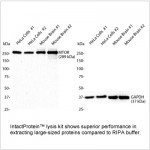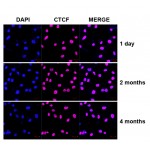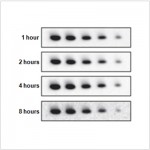| Reactivity: | H & H |
| Applications: | IHC & IF |
| Host Species: | Rabbit |
| Clonality: | Polyclonal |
| Full Name: | ACSS2 rabbit polyclonal |
Gene Name: | Acetyl-coenzyme A synthetase, cytoplasmic |
Synonyms: | AceCS, ACSS2, ACAS2, Acyl-activating enzyme, Acetate--CoA ligase, Acetyl-CoA synthetase, ACS, Acyl-CoA synthetase short-chain family member 2, ACSA |
Immunogen: | Recombinant protein corresponding to Mouse ACSS2 |
Isotype: | IgG |
Purity: | Affinity purification |
Subcellular location: | |
Uniprot ID: |
Product Usage Information
Applications | Species | Dilution | Positive tissue |
IHC | Human | 1: 500-1: 1000 | kidney, liver |
IF | Human | 1: 250-1: 500 | kidney, liver |
Background
ACSS2 (acyl-CoA synthetase short-chain family member 2), also known as ACAS2, ACS, ACSA or AceCS, is a 701 amino acid cytoplasmic protein that belongs to the ATP-dependent AMP-binding enzyme family. Existing as a monomer, ACSS2 functions to catalyze the ATP-dependent activation of acetate, a reaction that yields acetyl-CoA for use in energy generation and lipid synthesis. ACSS2 expression, which is highest in liver and kidney tissue, is regulated by the presence of unsaturated fatty acids and sterol regulatory element-binding proteins (SREBPs). Human ACSS2 exists as two alternatively spliced isoforms and shares 93% sequence identity with its mouse counterpart, suggesting a conserved role between species.
Images
 |
Immunohistochemistry analysis of paraffin-embedded human lung cancer using ACSS2 (GB11967) at dilution of 1: 500 |
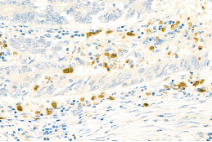 |
Immunohistochemistry analysis of paraffin-embedded human ovarian cancer using ACSS2 (GB11967) at dilution of 1: 500 |
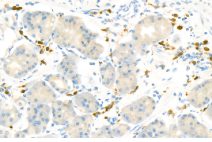 |
Immunohistochemistry analysis of paraffin-embedded human stomach using ACSS2 (GB11967) at dilution of 1: 500 |
Storage
| Storage | Store at -20°C for one year. Avoid repeated freeze/ thaw cycles. |
| Storage Buffer | PBS with 0.02% sodium azide, 100 μg/ml BSA and 50% glycerol. |

